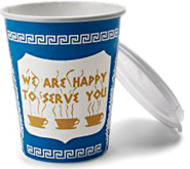My question is, as a eucharistic minister, would you have in your repertoire a short blessing that we can use when a non-Catholic or child comes up for a blessing during communion?
I use, ” May the Lord’s blessings come down upon you in abundance” Acceptable?
Well, actually, no. As I replied: technically, Extraordinary Ministers of Holy Communion shouldn’t be giving blessings, and I know quite a few priests who think the practice of doing this at communion, even by the ordained, is wrong.
A good explanation comes from Denver’s Archbishop Charles Chaput:
“As members of the community move forward to receive holy Communion during Mass, parents will often bring their small children along. Over the years, it has become a custom in many parishes for these children to receive a blessing. I don’t really know where this practice began, but it’s worth some reflection.
“Usually the children in line will look up expectantly at the person distributing holy Communion. The minister then responds by doing one of several things: He or she may pat the child’s head, or touch the head in a sign of blessing, or mark the child’s forehead with a sign of the cross. As warm and well intentioned as the gesture may be, in the context of the liturgy, the Communion procession really isn’t the time for a blessing of children or adults who are unable to receive Communion.
“There are times in the liturgical year when the laity assist in specific acts of blessing, such as the blessing of throats or the distribution of ashes. These are clearly indicated in the Book of Blessings. But extraordinary ministers of holy Communion do not ordinarily have a commission to bless in the name of the Church, as priests and deacons do. At this point in the liturgy, they have a very specific function: to collaborate with the clergy in the distribution of holy Communion.
“As we’ll explore in a later column, the blessing of the assembly properly occurs at the end of the Mass. As the body of Christ, the assembly is blessed together before we depart to live the fruits of the liturgy.
“What would be appropriate for children to do who accompany their parents in the Communion procession, and adults who do not receive Communion?
“The Communion procession is an opportunity for parents to begin to teach their children about the great gift of the Eucharist. First of all, children could learn to give reverence to the Lord hidden under the forms of bread and wine. Children can already learn from their parents, and others receiving holy Communion, to give honor to the Lord by bowing reverently.
“Parents and catechists should start teaching the mystery of the Eucharist at an early age. Children will soon begin to desire to receive holy Communion. This earnest desire to receive our Lord sacramentally is traditionally called a ‘spiritual communion.’ Regrettably, we don’t talk about spiritual communion as we once did. But Thomas Aquinas, Alphonsus Liguori and many other great saints strongly encouraged spiritual communion as a practice.
“Both children and adults can make a spiritual communion. They may come forward with their arms crossed and bow before the Eucharist. Then the priest, deacon or extraordinary minister could say to them kindly, ‘Receive the Lord Jesus in your heart.’ This is not a blessing, but an invitation to worship, so no gestures are made.
“This spiritual communion would more authentically carry out the spirit of the liturgy. Being faithful to the truths of the sacramental celebration allows all of us, young and old, to enter more deeply into worship.”

